So I Was Back In Mandarin Class And The Teacher Let Us Know That In Ancient Times Sometimes They Wouldn’t
So I was back in Mandarin class and the teacher let us know that in ancient times sometimes they wouldn’t even give their girl children names. Their attitude was why bother getting attached to her when she’s just going to grow up and belong to someone else? She doesn’t need her own identity because she is the property of her future husband. If they needed to refer to a woman they would say that’s Wang’s wife. In the same way you would say oh, that’s Wang’s car or Wang’s house. Let’s remember that we give names to dogs, horses, ships and buildings but some human women don’t deserve such recognition. She also touched on sex-selective abortion for a bit and it was all in all a pretty sad discussion today.
I was really moved but it felt like everyone else didn’t care or thought that stuff doesn’t matter because it doesn’t happen anymore. And yet even now women’s identities are being erased when they get married. Their personal history and family ties are untraceable because they are “adopted” into their husbands family. It’s disgusting and I hate that its so nomalized and I hate that even women’s names are not our own. We might as well never have been given names in the first place.
More Posts from Swirlspill-study and Others

I believe in free education, one that’s available to everyone; no matter their race, gender, age, wealth, etc… This masterpost was created for every knowledge hungry individual out there. I hope it will serve you well. Enjoy!
FREE ONLINE COURSES (here are listed websites that provide huge variety of courses)
Alison
Coursera
FutureLearn
open2study
Khan Academy
edX
P2P U
Academic Earth
iversity
Stanford Online
MIT Open Courseware
Open Yale Courses
BBC Learning
OpenLearn
Carnegie Mellon University OLI
University of Reddit
Saylor
IDEAS, INSPIRATION & NEWS (websites which deliver educational content meant to entertain you and stimulate your brain)
TED
FORA
Big Think
99u
BBC Future
Seriously Amazing
How Stuff Works
Discovery News
National Geographic
Science News
Popular Science
IFLScience
YouTube Edu
NewScientist
DIY & HOW-TO’S (Don’t know how to do that? Want to learn how to do it yourself? Here are some great websites.)
wikiHow
Wonder How To
instructables
eHow
Howcast
MAKE
Do it yourself
FREE TEXTBOOKS & E-BOOKS
OpenStax CNX
Open Textbooks
Bookboon
Textbook Revolution
E-books Directory
FullBooks
Books Should Be Free
Classic Reader
Read Print
Project Gutenberg
AudioBooks For Free
LibriVox
Poem Hunter
Bartleby
MIT Classics
Many Books
Open Textbooks BCcampus
Open Textbook Library
WikiBooks
SCIENTIFIC ARTICLES & JOURNALS
Directory of Open Access Journals
Scitable
PLOS
Wiley Open Access
Springer Open
Oxford Open
Elsevier Open Access
ArXiv
Open Access Library
LEARN:
1. LANGUAGES
Duolingo
BBC Languages
Learn A Language
101languages
Memrise
Livemocha
Foreign Services Institute
My Languages
Surface Languages
Lingualia
OmniGlot
OpenCulture’s Language links
2. COMPUTER SCIENCE & PROGRAMMING
Codecademy
Programmr
GA Dash
CodeHS
w3schools
Code Avengers
Codelearn
The Code Player
Code School
Code.org
Programming Motherf*?$%#
Bento
Bucky’s room
WiBit
Learn Code the Hard Way
Mozilla Developer Network
Microsoft Virtual Academy
3. YOGA & MEDITATION
Learning Yoga
Learn Meditation
Yome
Free Meditation
Online Meditation
Do Yoga With Me
Yoga Learning Center
4. PHOTOGRAPHY & FILMMAKING
Exposure Guide
The Bastards Book of Photography
Cambridge in Color
Best Photo Lessons
Photography Course
Production Now
nyvs
Learn About Film
Film School Online
5. DRAWING & PAINTING
Enliighten
Ctrl+Paint
ArtGraphica
Google Cultural Institute
Drawspace
DragoArt
WetCanvas
6. INSTRUMENTS & MUSIC THEORY
Music Theory
Teoria
Music Theory Videos
Furmanczyk Academy of Music
Dave Conservatoire
Petrucci Music Library
Justin Guitar
Guitar Lessons
Piano Lessons
Zebra Keys
Play Bass Now
7. OTHER UNCATEGORIZED SKILLS
Investopedia
The Chess Website
Chesscademy
Chess.com
Spreeder
ReadSpeeder
First Aid for Free
First Aid Web
NHS Choices
Wolfram Demonstrations Project
Please feel free to add more learning focused websites.
*There are a lot more learning websites out there, but I picked the ones that are, as far as I’m aware, completely free and in my opinion the best/ most useful.








did some review for our botany quiz on monday! i accidentally fell asleep throughout the entirety of our teacher’s three-hour lecture, but thank the heavens for powerpoint presentations aaaa

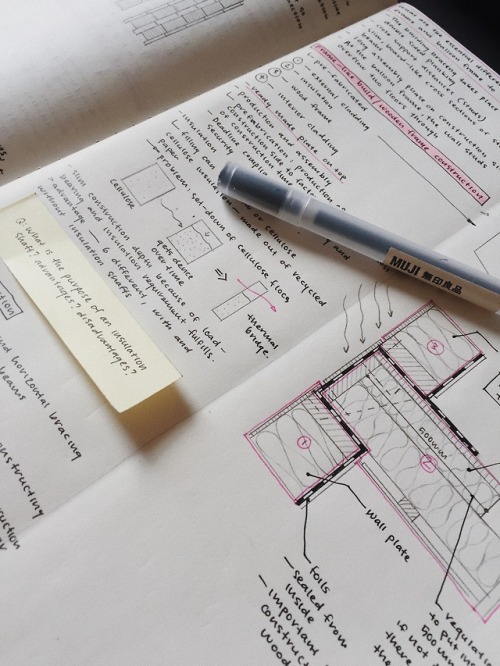
14/03/19 - Some more technology notes and diagrams. A slow but productive day today!

Researching for a project? Looking for open-access, high quality databases, encyclopedias and resources to help you write your next paper? Here’s a list of some great ones to help you find exactly what you were looking for.
Research Managers
Zotero
Mendeley
Qiqqa
General
List of academic databases and search engines
Our World in Data
Search Engines
100 Time-Saving Search Engines for Serious Scholars
Top 11 Trusted (And Free) Search Engines For Scientific and Academic Research
Ten search engines for researchers that go beyond Google
12 Fabulous Academic Search Engines
The 6 BEST Search Engines for Academic Research
20 of the Best Search Engines for Students
Best Educational Search Engines For Academic Researchers
Databases
Directory of Open Access Journals
New York Public Library Articles and Databases
UCSB Article Indexes & Research Databases
DATABASES: Library of Congress E-Resources Online Catalog
FINDING CURRENT RESEARCH USING FREE ONLINE RESOURCES
Free Databases for Magazine/Journal Articles, etc.
Free Full-Text Resources for Grad School Papers
Online Reference: Open Access Databases
Free Online Full-text Articles
Free scholarly resources
International Education Research Database
PubMed
Sci-Hub
Database checklist: Key academic research resources — both free and restricted
Research Databases and Other Online Tools
Encyclopedias
Top Encyclopedia Sites for Student Research Papers
RefSeek’s Encyclopedias
Encyclopedia.com
Infoplease
Internet Encyclopedia of Philosophy
Medline Plus
Dictionaries
RefSeek’s dictionaries and thesauri
The 10 Best Online Dictionaries
Essay and Paper Writing
Essay and Paper Writing Masterpost
To all my freshman babies who are panicking right now about how much your college textbooks cost: Yeah, you’re right, that’s some highway robbery. No, you don’t have to lie down and take it. You have options. Follow my advice and fly on your own debt free wings.
1. Forgoe the bookstore entirely. Sometimes you can get a good deal on something, usually a rental, but it’s usually going to be considerably more expensive to go through official channels. Outsmart them, babies.
2. Does your syllabus call for edition eight? Get edition seven. Old editions are considered worthless in the buyback trades, so they sell for dirt cheap, no matter how new they are. It’s a gamble, sure; there might be something in edition eight you desperately need, but that never happened to me. However, I’ve only ever pulled this stunt for literature/mass comm/religious studies books, so I don’t know it would work in the sciences.
3. Thriftbooks.com, especially for nonfiction and fiction. Books are usually four or five dollars unless they’re really new, and shipping is 99 cents unless you buy over 10$ in books, in which case shipping is free.
4. Bigwords.com. It will scan every textbook seller on the internet for the lowest price available, and will do the same to find the highest price when you try to sell your books back at the end of term. Timesaver, lifesaver.
5. In all probability, your library offers a service called interlibrary loan which is included in your tuition. This means if your library doesn’t carry a book you can order it for free from any library nationwide in your library’s network and it will be shipped to you in a number of days. Ask a librarian to show you how to search for materials at your library as well as though interlibrary loan; you’ll need to master this skill soon anyway. If you get lucky you can just have your required reading shipped to you a week before you need to start reading, then renew vigorously until you no longer need to item. I’m saving over 100$ on a History of Islam class this way.
You professors might side-eye you for bringing an old edition or a library copy, but you just smile right back honey, because you can pay your rent and go clubbing this month. You came here to win. So go forth and slay.
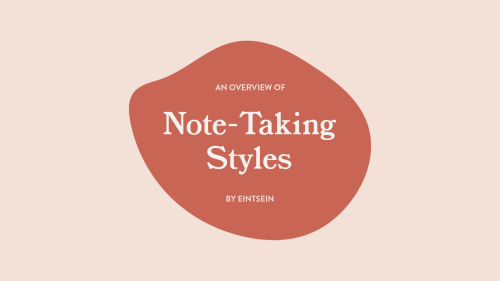

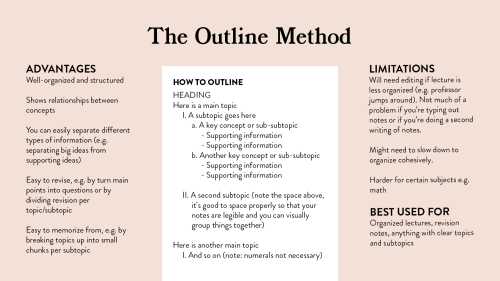
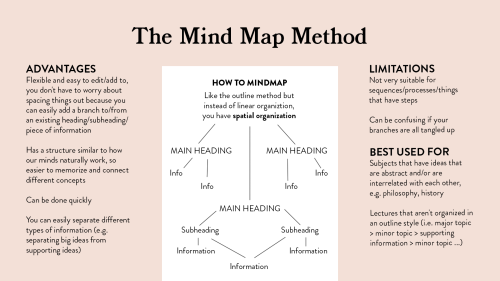

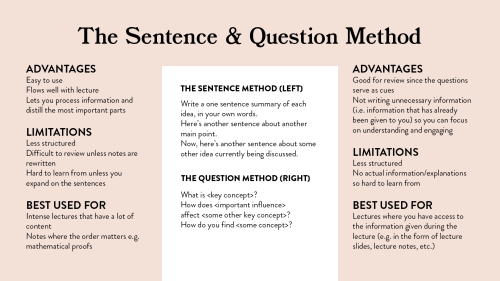


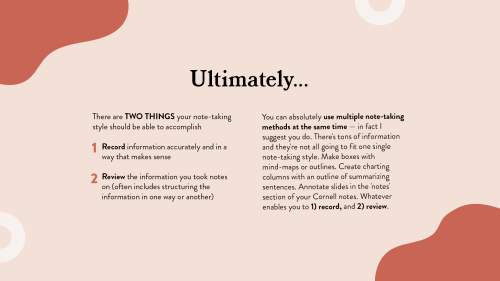
An Overview of Note-Taking Styles
Note-taking is one of the most essential skills a student should master. It allows you to record and review information to be used in the future. But what’s the best way to do so? Here’s an overview of note-taking styles that can help you maximize your learning!

HOW TO WRITE A HIGH-GRADE RESEARCH PAPER
~~~~~~~~~~~~~~~~~~~~~~~~~~~~~~~~~~~~~~~~~~
The first time I had to write a research paper for university was one of the most stressful experiences I’d ever had - it was so different to anything I’d ever done before and caused me so much anxiety! It turned out that I’m pretty damn good at writing research reports and I’m now looking to pursue a career in psychological research.
I have never received less than a First (or 4.0 GPA for you American studiers) in my research papers so I thought I’d share my top tips on how to write a kick-ass, high-grade research paper.
*disclaimer: I am a psychology student, my tips are based on my personal experience of writing up psychological research (quantitative and qualitative); therefore, they may require some adaptation in order to be applied to your field of study/research*
These tips will be split up into the different sections a research paper should consist of: abstract, introduction, methods, results, discussion, references and formatting.
ABSTRACT
The aim of an abstract is to summarise your whole paper - it should be concise, include key-words, highlight the key points of your paper and be written last.
When I say concise, I mean concise! The abstract is what other students and researchers will read in order to decide whether your research is relevant their own work and essentially determines whether or not they’ll read on - they want to know the key details and don’t want to be overwhelmed with information.
I always aim to keep my abstracts under 250 words. I set myself this limit to stop myself waffling and dwelling on unimportant points, it helps me to be really selective of what I include and ensures I’m gripping the reader from the start.
Your abstract should discuss the research rationale, the methods and designs used, your results and the general conclusion(s) drawn. One or two sentences on each of these topics is enough.
Make sure you’re using key-words throughout your abstract as this will also help the reader decide whether your work is relevant to theirs. You can make key-words super obvious by highlighting them in a key at the bottom of your abstract (see below) or just used jargon consistently. Using key-words is also important if you’re looking to get your work published, these words will help people find your work using search engines.

Finally, write your abstract last! An abstract is a summary of your whole research paper which makes it practically impossible to write well first. After writing the rest of your paper, you will know your research inside and out and already have an idea of what key things you need to highlight in your abstract.
INTRODUCTION
For me, the introduction section is always the most intimidating to write because it’s like painting on a blank canvas - massively daunting and leaving you terrified to make a mistake!
The aim of an introduction is to provide the rationale for your research and justify why your work is essential in the field. In general, your introduction should start very broad and narrow down until you arrive at the niche that is your research question or hypothesis.
To start, you need to provide the reader with some background information and context. You should discuss the general principle of your paper and include some key pieces of research (or theoretical frameworks if relevant) that helps your reader get up to speed with the research field and where understanding currently lies. This section can be pretty lengthy, especially in psychological research, so make sure all of the information you’re including is vital as it can be pretty easy to get carried away.
This background should lead you onto the rationale. If you’ve never written a research paper before, the rationale is essentially the reason behind your own research. This could be building on previous findings so our understanding remains up to date, it could be picking up on weaknesses of other research and rectifying these issues or it could be delving into an unexplored aspect of the field! You should clearly state your rationale and this helps lead into the next section.
You should end your introduction by briefly discussing your current research. You need to state your research question or hypothesis, how you plan on investigating the question/hypothesis, the sample you plan on using and the analysis you plan to carry out. You should also mention any limitations you anticipate to crop up so you can address these in your discussion.
In psychology, references are huge in research introductions so it is important to use an accurate (and modern as possible) reference for each statement you are making. You can then use these same references in your discussion to show where your research fits into the current understanding of the topic!
METHODS
Your methods section should make use of subheadings and tables where necessary and should be written in past tense. This can make the (potentially) lengthy section easier to navigate for the reader. I usually use the following headings: participants, materials, design, procedure.
The participants section should describe the sample that took part in your research. Age, gender, nationality and other relevant demographic information should be provided as well as the sampling technique. Personally, I use a table (see below) alongside my continuous prose as an alternative way of viewing my sample population. Please note, if you’re using a table make sure it adheres to your university guidelines.

The materials section of your methods should include any equipment, resources (i.e. images, books, diagrams) or any other materials used in your data collection. You should also reference the program that helped you conduct your analysis. For example, if you are writing a qualitative research paper, you may want to include Microsoft Word in your materials if you use the program to transcribe interviews.
You should then describe the design used in your research. All variables should be identified in this paragraph, if relevant. You should also discuss whether your research is within-groups or between-groups, again only if relevant.
Last is your procedure section - the most important one! You must write this section with enough detail so that anybody could pick it up, read it and conduct the same experiment with ease. You should describe what participants were required to do, how data was collected and it should be written in chronological order! While it’s important to provide enough information, try not to overwhelm the reader with lengthy sentences and unnecessary information.
RESULTS
Your results section’s sole purpose is to provide the reader with the data from your study. It should be the second shortest section (abstract being first) in your research paper and should stick to the relevant guidelines in regards to reporting figures, tables and diagrams. Your goal is to relay results in the most objective and concise way possible.
Your results section serves to act as evidence for the claims you’ll go on to make during your discussion but you must not be biased in the results you report. You should report enough data to sufficiently justify your conclusions but must also include data that doesn’t support your original hypothesis or research question.
Reporting data is most easily done through tables and figures as they’re easy to look at and select relevant information. If you’re using tables and figures you should always make sure you’re stating effect sizes and p values and to a consistent decimal place. Illustrative tables and figures should always be followed by supporting summary text consisting of a couple of sentences relaying the key statistical findings in continuous prose.
DISCUSSION
The discussion section should take the opposite approach to your introduction! You should start discussing your own research and broaden the discussion until you’re talking about the general research field.
You should start by stating the major findings of your study and relating them back to your hypothesis or research questions. You must must must explicitly state whether you reject or accept your experimental hypothesis, if you have one. After stating your key findings you should explain the meaning, why they’re important and where they fit into the existing literature. It’s here that you should bring back the research you discussed in your introduction, you should relate your findings to the current understanding and state the new insight your research provides.
You should then state the clinical relevance of your research. Think about how your findings could be applied to real-life situations and discuss one or two practical applications.
After this, discuss the limitations of your research. Limitations could include sample size and general sample population and how this effects generalisability of findings, it could include methodological problems or research bias! These limitations will allow you to discuss how further research should be conducted. Suggest ways in which these limitations could be rectified in future research and also discuss the implications this could have on findings and conclusions drawn.
Finally, you need to give the reader a take-home message. A sentence or two to justify (again) the need for your research and how it contributes to current understanding in the field. This is the last thing your audience will read so make it punchy!
~~~~~~~~~~~~~~~~~~~~~~~~~~~~~~~~~~~~
That’s it folks! My tips for writing a kick-ass, high-grade research paper based on my personal experience. If you have any questions regarding things I’ve missed or didn’t provide enough detail of, then please just send me an ask!
Also, if any of you would like to read any of my past research papers I would be more than happy to provide you with them :-))
-
 doyoupraisethewalls liked this · 1 month ago
doyoupraisethewalls liked this · 1 month ago -
 0clownhouse0 liked this · 1 month ago
0clownhouse0 liked this · 1 month ago -
 blhadyblah reblogged this · 2 months ago
blhadyblah reblogged this · 2 months ago -
 blhadyblah liked this · 2 months ago
blhadyblah liked this · 2 months ago -
 bookstolookat reblogged this · 3 months ago
bookstolookat reblogged this · 3 months ago -
 ricecakesonice liked this · 4 months ago
ricecakesonice liked this · 4 months ago -
 macewombat liked this · 4 months ago
macewombat liked this · 4 months ago -
 strangecollectionperson liked this · 5 months ago
strangecollectionperson liked this · 5 months ago -
 dallaslecter liked this · 5 months ago
dallaslecter liked this · 5 months ago -
 aprilpoison liked this · 5 months ago
aprilpoison liked this · 5 months ago -
 there-was-a-girl reblogged this · 5 months ago
there-was-a-girl reblogged this · 5 months ago -
 lilac-trees7 liked this · 5 months ago
lilac-trees7 liked this · 5 months ago -
 taylor14firefly liked this · 5 months ago
taylor14firefly liked this · 5 months ago -
 fleurmarigold liked this · 5 months ago
fleurmarigold liked this · 5 months ago -
 shrubs4010 liked this · 5 months ago
shrubs4010 liked this · 5 months ago -
 azuriteash liked this · 5 months ago
azuriteash liked this · 5 months ago -
 gojobiscuit reblogged this · 6 months ago
gojobiscuit reblogged this · 6 months ago -
 gojobiscuit liked this · 6 months ago
gojobiscuit liked this · 6 months ago -
 pixiefemmeinist reblogged this · 6 months ago
pixiefemmeinist reblogged this · 6 months ago -
 pixiefemmeinist liked this · 6 months ago
pixiefemmeinist liked this · 6 months ago -
 pusheen-the-radical liked this · 6 months ago
pusheen-the-radical liked this · 6 months ago -
 ryasanda reblogged this · 6 months ago
ryasanda reblogged this · 6 months ago -
 artsyknitsyoopsydaisy liked this · 6 months ago
artsyknitsyoopsydaisy liked this · 6 months ago -
 incrediblue reblogged this · 6 months ago
incrediblue reblogged this · 6 months ago -
 moonsmilesatnyx reblogged this · 6 months ago
moonsmilesatnyx reblogged this · 6 months ago -
 moonsmilesatnyx liked this · 6 months ago
moonsmilesatnyx liked this · 6 months ago -
 coraljellyfishs-blog liked this · 6 months ago
coraljellyfishs-blog liked this · 6 months ago -
 thelaughingbird reblogged this · 6 months ago
thelaughingbird reblogged this · 6 months ago -
 sarkanyfajzat liked this · 6 months ago
sarkanyfajzat liked this · 6 months ago -
 whacknuggets reblogged this · 6 months ago
whacknuggets reblogged this · 6 months ago -
 stigmata-stigma reblogged this · 6 months ago
stigmata-stigma reblogged this · 6 months ago -
 bisexual-problem reblogged this · 6 months ago
bisexual-problem reblogged this · 6 months ago -
 dramaticbucket reblogged this · 6 months ago
dramaticbucket reblogged this · 6 months ago -
 womens-suffrage-revival-squad reblogged this · 6 months ago
womens-suffrage-revival-squad reblogged this · 6 months ago -
 womens-suffrage-revival-squad liked this · 6 months ago
womens-suffrage-revival-squad liked this · 6 months ago -
 violence-theanswer reblogged this · 6 months ago
violence-theanswer reblogged this · 6 months ago -
 lordloxley reblogged this · 6 months ago
lordloxley reblogged this · 6 months ago -
 radicalite liked this · 6 months ago
radicalite liked this · 6 months ago -
 voicesinmovement reblogged this · 6 months ago
voicesinmovement reblogged this · 6 months ago -
 voicesinmovement liked this · 6 months ago
voicesinmovement liked this · 6 months ago -
 womenstruation reblogged this · 6 months ago
womenstruation reblogged this · 6 months ago
a study blog for collected references, advice, and inspiration
267 posts





